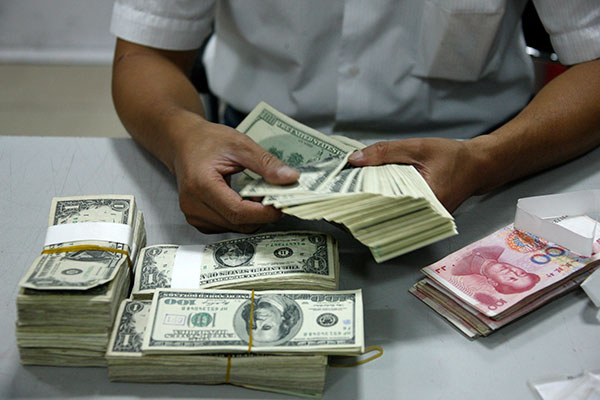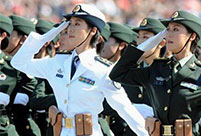

 |
| A teller counts currency at a branch of the Industrial and Commercial Bank of China in Huaibei, Anhui province. China's foreign exchange reserves dropped to $3.65 trillion last month, down by $42.5 billion from the level in June.[Xie Zhengyi / China Daily] |
Capital outflows surge as worries about weak economic growth increase, says central bank
China's foreign exchange reserves slipped to a two-year low by the end of July, the People's Bank of China, the central bank, said on Friday, implying more capital outflows amid expectations of a fragile economic rebound and a stronger dollar.
The nation's reserves dropped to $3.65 trillion last month, down by $42.5 billion from the level in June, the sharpest monthly decline since March, according to PBOC data.
July's decrease marks the third consecutive month that the forex reserves have fallen. It has dropped by $343 billion from a historic high of $3.99 trillion in June 2014. Despite the fall, China still has the largest foreign exchange reserves in the world.
Worries about weak economic growth in the second half of the year have triggered capital outflows, said Zeng Gang, a researcher covering the banking industry at the Chinese Academy of Social Sciences.
"Market expectations of an appreciation in the US dollar have also fueled capital outflows," he said.
Earlier data showed that in the second quarter, the country's foreign exchange reserves fell by $36.2 billion, the fourth consecutive quarter of decline.
"It is a reasonable and acceptable adjustment so far, which will help reverse the long-term expansion of the large foreign exchange reserves, without any risks," said Zeng.
Economists expect a slightly weaker GDP growth in the third quarter, compared with the 7 percent growth in the second quarter, characterized by stable industrial activity and infrastructure investment, but dragged by softening financial activity and the downtrend in property construction.
To supplement the liquidity outflows, economists expect the central bank to further reduce the amount of cash that is required to be held as reserves by financial institutions.
Zhu Haibin, chief economist in China with JPMorgan Chase & Co, said: "For policymakers, it is important to monitor the underlying factors that have driven capital flow dynamics, especially as China is planning to push forward capital account liberalization and allow its currency (the yuan) to play a bigger role in the global financial market."
The International Monetary Fund reiterated on Wednesday that the executive board will decide whether the yuan will be included in its Special Drawing Rights basket at the end of the year, pushing forward China's capital account opening and exchange rate reforms.
The PBOC started to report its foreign exchange reserves on a monthly basis recently, shifting from a quarterly basis, to adopt the IMF's Special Data Dissemination Standard asking for more transparent information.
The central bank said in a separate statement on Friday that it will continue to monitor cross-border capital flows closely to curb "abnormal" flows of foreign exchange.
It also pledged more financial reforms to prevent systemic risks.
China's gold reserves declined to $59.24 billion by the end of July, compared with $62.4 billion at the end of June, the PBOC said. Total gold reserves stood at 1,658 tons at the end of June, up 57 percent from the last time it adjusted the reserve figures more than six years ago.
 Female soldiers add color to military parades
Female soldiers add color to military parades Taiwan campus belle with gorgeous look
Taiwan campus belle with gorgeous look  Stunning photos of China’s fighters and airborne troops
Stunning photos of China’s fighters and airborne troops Mums stage breastfeeding flash mob
Mums stage breastfeeding flash mob PLA South China Sea Fleet conducts live fire exercise
PLA South China Sea Fleet conducts live fire exercise Beauty of Tsinghua University transforms into car model
Beauty of Tsinghua University transforms into car model Official shot having sex with two college girls
Official shot having sex with two college girls Moscow “spider-man” climbs Chinese skyscraper
Moscow “spider-man” climbs Chinese skyscraper No cleavage allowed at China’s largest gaming expo this year
No cleavage allowed at China’s largest gaming expo this year Shared destiny for Asia: FM
Shared destiny for Asia: FM Web police stations not to curb expression
Web police stations not to curb expression More civil servants leaving their jobs for better pay, sense of achievement
More civil servants leaving their jobs for better pay, sense of achievement Japan struggles to deal with legacy of comfort women system, compensation
Japan struggles to deal with legacy of comfort women system, compensationDay|Week